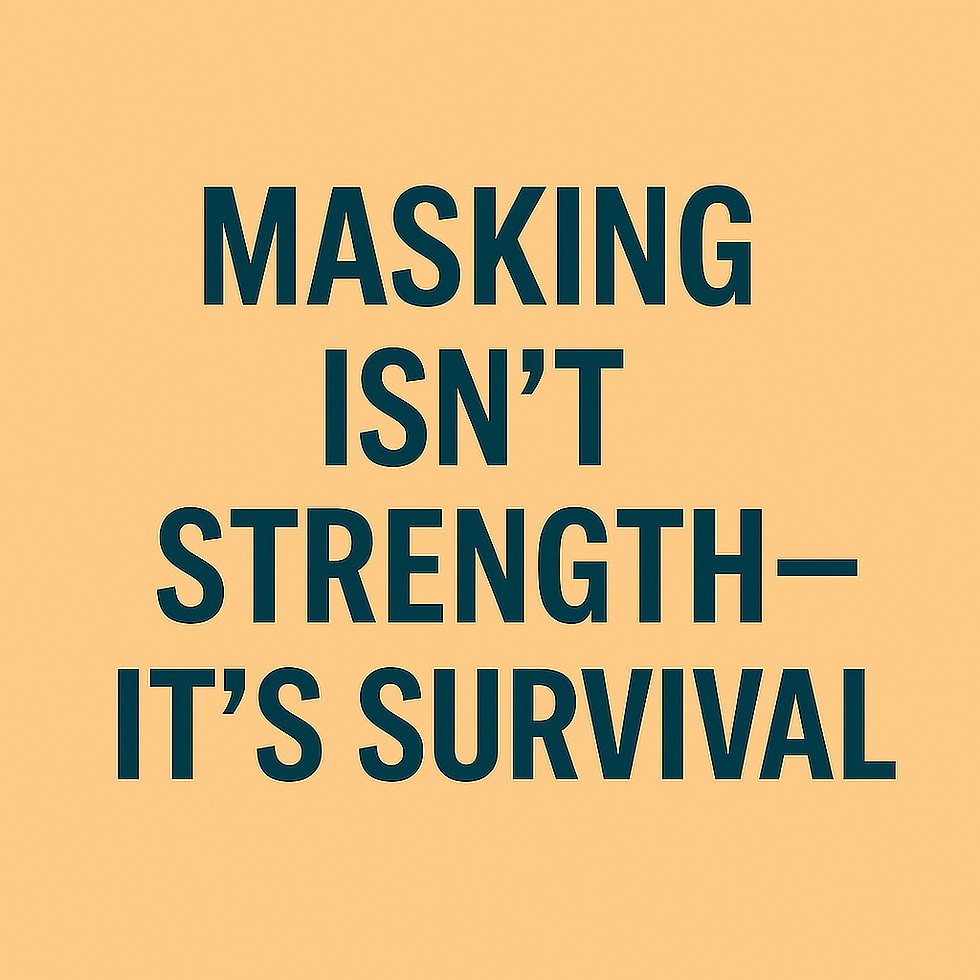Masking Isn’t Strength — It’s Survival
- James Link

- Apr 5, 2025
- 2 min read

If you’ve ever felt the need to suppress who you are just to get through the day, you’ve experienced a version of masking. For neurodivergent people, masking is more than a habit — it’s often a learned survival skill, used to avoid judgment, rejection, or misunderstanding in a world that doesn’t always accept difference.
This post is part of our Autism Acceptance Month series, and it’s about pulling back the curtain on one of the most emotionally exhausting parts of navigating daily life as a neurodivergent person — especially in professional and social spaces.
What Is Masking?
Masking is the conscious or unconscious act of camouflaging neurodivergent traits to meet neurotypical expectations. It might look like:
Forcing eye contact, even when it feels unnatural
Hiding stimming behaviors like tapping or fidgeting
Mimicking the tone, speech, or gestures of others
Holding back honest reactions to avoid misinterpretation
Silently enduring sensory discomfort in overwhelming spaces
For many autistic or ADHD adults, this becomes second nature — often so ingrained that they don’t even realize how much they’re doing it.
But masking has a cost.
The Hidden Toll of Masking
1. Chronic Exhaustion
Trying to manage every interaction, every expression, and every movement takes a toll. It’s not just social fatigue — it’s deep mental and emotional depletion that builds over time.
2. Identity Confusion
The longer you spend masking, the harder it becomes to tell where the mask ends and your real self begins. That confusion can lead to anxiety, self-doubt, and disconnection from your own needs.
3. Mental Health Struggles
Masking is linked to higher rates of anxiety, depression, and burnout. It isolates people from the support they deserve — because when you appear “fine,” people assume you are.
4. Missed Accommodations
When traits are hidden, accommodations aren’t offered. Neurodivergent professionals often go without help, not because they don’t need it — but because their effort to blend in works too well.
A Better Way Forward: Reducing the Need to Mask
This isn’t about blaming individuals for masking. It’s about changing the systems that make masking feel necessary.
Normalize different communication styles
Allow space for written responses, processing time, and alternative forms of participation.
Create sensory-friendly work environments
Think flexible lighting, quiet rooms, or remote work options.
Train leadership on neurodiversity
Shift from valuing conformity to celebrating innovation, perspective, and unique contributions.
Final Thoughts: You Shouldn’t Have to Pretend to Belong
Masking isn’t strength. It’s survival. And while it may get people through the day, it shouldn’t be required for acceptance.
If you’re neurodivergent and tired of masking — you’re not alone.
If you’re in a position to make your school, workplace, or community more inclusive — please do.
Authenticity should never be a liability.
This Autism Acceptance Month, let’s push for a world where no one has to mask just to be seen, heard, or respected.





These are really great, Jim!